The Supreme Court has given its verdict on the appointment of aldermen in the Delhi Municipal Corporation. The court said that the Lieutenant Governor (LG) can appoint aldermen in the Municipal Corporation without consulting the government.
The AAP government has suffered a major setback after the court’s decision. The Delhi government had filed a petition in the court challenging the Lieutenant Governor’s decision to appoint aldermen in the Municipal Corporation without the advice of the Council of Ministers. While hearing this, the Supreme Court had reserved its decision in May last year.
The court held that the LG has been given statutory power under the Municipal Corporation Act. While the government acts on executive power. Therefore, the LG should act as per the statutory power and not as per the aid and advice of the Delhi government. The court said that the Municipal Corporation Act provides that the LG can nominate up to ten persons having special knowledge in municipal corporation administration.
Justice PS Narasimha said that the statutory power to nominate persons having special knowledge under Section 3(3)(b)(i) was first given to the LG by the 1993 amendment of the DMC Act 1957. The purpose of the LG is to act as per the mandate of the law and not to be guided by the aid and advice of the Council of Ministers. The power exercised is the statutory duty of the LG and not the executive power of the state.
Also Read: Bank of India (BOI) has increased the rates of Fixed Deposit. check the latest interest rate
The Municipal Corporation of Delhi (MCD) has 250 elected and 10 nominated members. The Delhi government had alleged that the Lieutenant Governor had nominated 10 members without its aid and advice. A bench of Chief Justice DY Chandrachud, Justice JB Padriwala and Justice Manoj Mishra in the apex court was hearing a petition filed by MCD Mayor Shelly Oberoi. Shelly Oberoi has demanded in her petition that the Municipal Corporation be allowed to exercise the functions of its standing committee.
CJI had said this
The Supreme Court had said that giving the Lieutenant Governor the right to nominate ‘alderman’ in the MCD means that he can destabilize the elected municipal body. The bench headed by the CJI had said this while reserving the decision on the petition challenging the Lieutenant Governor’s right to nominate ‘alderman’ in the MCD.
This claim was made in the petition
The petition filed by the Delhi government claimed that since the implementation of Article 239AA of the Constitution in 1991, this is the first time that the Lieutenant Governor has nominated ‘alderman’ in this way, completely bypassing the elected government. It also said that the LG is bound to act on the help and advice of the Council of Ministers. If there is any disagreement, he can send the issue to the President. The petition said that the Lieutenant Governor has only two options, first – the names suggested by the elected government should be approved and second – if there is no consensus on the proposal, it should be sent to the President. The Supreme Court had sought a reply from the Delhi LG in this matter in March.
This is why the controversy arose
Actually, the role of aldermen is very important in the Delhi Municipal Corporation which has 250 councillors. Aldermen cannot vote during the election of the mayor or passing of any bill, but they can vote in the zonal committees. For the election of the most powerful standing committee of the Municipal Corporation, members are elected from the zonal committees only. In such a situation, the role of aldermen indirectly becomes very important in the formation of the standing committee.
This is the reason why Aam Aadmi Party and the Lieutenant Governor of Delhi are trying their best to keep the appointment of aldermen in their hands. At the time of the last mayor’s election, Lieutenant Governor VK Saxena had appointed 10 aldermen. BJP was also trying to give them the right to vote, while AAP was not ready to give the aldermen the right to vote as per the previous tradition. Ultimately this dispute reached the doorstep of the Supreme Court in which the court refused to give the aldermen the right to vote in the Municipal Corporation House.



